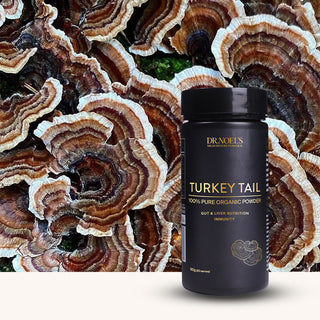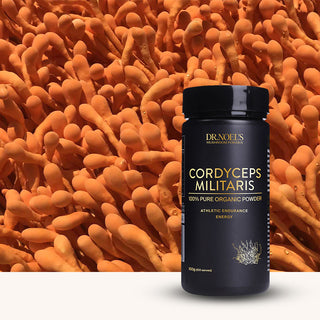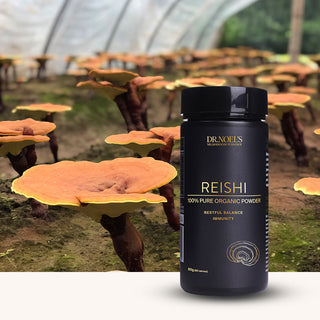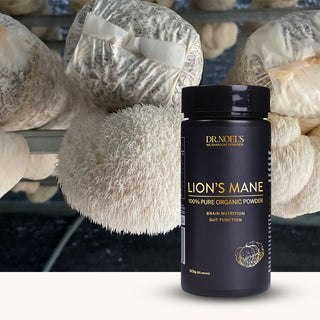
The immune system in humans is a delicate balancing act. Our immune system “upregulates” (becomes stronger) to combat an infection when we have a disease to fight. However, excessive immune activity might result in an overactive immune system, as with autoimmune disorders.
The use of medicinal mushrooms for health support dates back many centuries, especially in early Chinese, Egyptian, Greek, Mexican, and Roman societies. This is because they have immunomodulating actions, which keep the immune system balanced by stimulating it when something needs to be fought (like cancer and infections) and suppressing it when it becomes overactive.
Trametes versicolor, also known as “Turkey tail,” is a fungus that has been used for millennia to treat a variety of ailments all across the world. But the potential of the Turkey tail mushrooms to strengthen your immune system may be its most outstanding feature.
Here is a comprehensive guide on the benefits of Turkey tail on immune health and how it may help fight infections and cancer.
What Makes Turkey Tail A Potent Immunomodulatory Mushroom?
Turkey tail mushrooms act as a turbo shot to your immune system because they are a powerhouse of bioactive compounds like antioxidants, polysaccharides, and beta-glucans. Let’s uncover each of these in detail to understand better how these medicinal mushrooms provide immune support.
Antioxidants
Antioxidants are substances that help prevent or minimize oxidative stress-related harm. An imbalance between antioxidants and unstable chemicals known as free radicals leads to oxidative stress. This may lead to cellular damage and inflammation. Additionally, this imbalance has been linked to a higher chance of contracting illnesses like several malignancies and heart disorders.
Turkey tail is rich in flavonoids and phenols, two powerful antioxidants. In a study, a sample of Turkey tail mushroom extract contained the flavonoid antioxidants quercetin and baicalein in addition to over 35 other phenolic components (1).
Flavonoid and phenol antioxidants help maintain the immune system’s health by lowering inflammation and encouraging the release of protective chemicals. For instance, it has been demonstrated that quercetin inhibits the production of pro-inflammatory enzymes while promoting the release of immunoprotective proteins like interferon-y.
Polysaccharopeptides
Polysaccharopeptides are polysaccharides (carbohydrates) that are protein-bound and are present in Turkey tail mushroom extract. The mushroom contains two different kinds of polysaccharopeptides: Polysaccharide peptide (PSP) and krestin (PSK).
Both PSK and PSP have potent immune-stimulating qualities (2). They support immunological response by activating and inhibiting particular types of immune cells and reducing inflammation.
PSK stimulates dendritic cells that support immunity to toxins and control the immune response. Additionally, PSK causes the white blood cells known as macrophages, which defend your body from hazardous agents like certain bacteria, to become active.
Monocytes are a subset of white blood cells that fight infection and strengthen immunity, and research in test tubes has shown that PSP enhances their production (3). PSP and PSK are frequently utilized as anticancer drugs in nations like Japan and China, together with surgery, chemotherapy, and radiation therapy, because of their natural capacity to boost the immune system(4).
Beta-glucans
It’s time to learn more about beta-glucans if you don’t already. The cell walls of bacteria, fungi, yeasts, algae, and plants contain two different kinds of complex sugars (polysaccharides): beta-glucans. These potent sugars stimulate immune system response by interacting with immune cells, especially in people with compromised immunological defenses.
According to a 2017 literature review, in animal and human research trials, beta-glucans have been shown to have antitumor, anti-inflammatory, and immunomodulating effects (5).
The highest concentrations of beta-glucans are found in adequately extracted high quality Turkey tail powders. Research suggests that these polysaccharides may support the body’s defenses against cancer, infection, and other illnesses.
Now that you know more about the fantastic compounds present in Turkey tail, let’s look at some scientific research on the immune-health benefits of this prolific fungi.

Benefits Of Turkey Tail Mushrooms On Cancer Treatment
Turkey tail is perhaps most renowned for its ability to be used as a natural alternative to conventional treatments like chemotherapy to cure some malignancies. According to a review of 13 studies, patients who received 1-3.6 grams of Turkey tail mushroom per day in addition to standard treatment showed a significant survival advantage. There was a 9% reduction in 5-year mortality for those with breast cancer, gastric cancer, or colorectal cancer treated with Turkey tail and chemotherapy compared to chemotherapy alone (6).
Likewise, an increase in immune system cells that fight cancer, such as natural killer cells and lymphocytes, was observed in 11 breast cancer patients who received 6–9 grams of Turkey tail powder daily after radiation therapy (7).
Another analysis of eight studies involving more than 8,000 patients with stomach cancer revealed that those who received chemotherapy plus PSK recovered more quickly from surgery than those who received chemotherapy alone (8).
Now, let’s look at some specific cancers and the effect of the compounds found in Turkey tail on them.
Colon cancer
According to studies, PSP derived from Turkey tail extract may suppress colon cancer cell proliferation (9). The authors found that PSP may also prevent colon cancer cells from spreading and infecting healthy cells.
Based on a systematic review and meta-analysis, Turkey tail PSK is a safe and effective supplement for people with colorectal cancer or other types of intestinal cancer (10). In addition, the review’s authors concluded that PSK users may have higher survival rates, and they advise using PSK in conjunction with chemotherapy.
Breast cancer
Nine people with stage 1, stage 2, or stage 3 breast cancer received conventional chemotherapy and radiation treatments in a single, small research (11). After that, they consumed 3, 6, or 9 grams of Turkey tail extract every day for six weeks in divided doses. After conducting their analyses, the researchers concluded that the extract helped the immune system produce more cancer-fighting cells.
Another study examined the organic supplements that medical professionals advise using in addition to chemotherapy (12). The authors refer to the extract as “chemotherapy-compatible,” claiming that Turkey tail extract was the natural treatment most frequently recommended to patients with breast cancer.
Turkey Tail Mushroom Benefits For Gut Health
It’s essential to maintain a balanced population of good bacteria in your gut if you want to keep your immune system strong. This is because your immune response strongly impacts how your gut bacteria interact with immune cells.
Prebiotics found in Turkey tail help feed these beneficial bacteria. For example, consuming 3,600 mg of PSP derived from Turkey tail mushrooms daily resulted in positive changes in gut flora and inhibited the growth of the potentially harmful E. coli and Shigella bacteria, according to an 8-week study in 24 healthy individuals (13).
Immunomodulating Health Benefits Of Turkey Tail Extracts
The polysaccharopeptide (PSP) from Turkey tail showed immunomodulating effects in this Australian study (14). When researchers assessed the peptide’s proliferative potential on different immune groups in the blood, an increase in monocytes was seen.
According to a 2017 analysis, PSP’s activation of predominantly pro-inflammatory proteins (cytokines) is the best-known immunomodulatory effect (15). These substances’ local and systemic actions can achieve the intended results.
PSP also activates a variety of immune cell subtypes, promoting cytokine production and proliferation. Similarly, Turkey tail-derived substances significantly influence specific types of immunity.
Healthy mice who were given Turkey tail mushroom extract for two weeks had their blood antibody (IgG) levels nearly double that of those who weren’t given the fungus extract. Researchers also discovered that PSP induces the formation of antibodies, hence promoting immunological responses. Additionally, the Turkey Tail extracts modify immune cell activity by lowering stress linked to damaging free radicals.
The mycelium of Turkey tail mushroom and its fermented substrate demonstrated powerful and complimentary immune-stimulating effects in vitro, according to a study published in 2019 (16). The mycelium was grown on rice flour, mechanically removed from the substrate that had been fermented, dried, and ground.
Several types of substrate and Turkey tail mycelium were examined on human blood cell cultures for their ability to activate and modulate the immune system.
Additionally, the mycelium of Turkey tail mushroom strongly induced CD69, a lymphocyte and monocyte activation marker. Significant and dose-dependent increases in immune-activating pro-inflammatory and anti-inflammatory cytokines were also brought about.
FAQs About Turkey Tail Mushroom For The Immune System
What Mushroom Is Best For Immunity?
Medicinal mushrooms like Turkey tail, Reishi, Chaga, Lion’s mane, Maitake, and Cordyceps provide immune support. Even modern research has backed up the immune-health benefits of these functional fungi.
Does Turkey Tail Mushroom Cure Cancer?
Turkey tail cannot replace anti-cancer drugs, nor can they cure the disease. Instead, Turkey tail mushrooms might help some people with cancer treatment by boosting their immune systems.
Does Turkey Tail Mushroom Help With Virus?
Turkey tail provides many health advantages, but its antiviral and antifungal properties stand out because they support the body’s immune system in warding off infections and viruses. The effectiveness of turkey tail mushroom extracts like PSP and PSK in treating viral infections has been suggested in various studies.
Key Takeaways
Turkey tail mushrooms might help some people with cancer treatment by boosting their immune systems. They also seem to modulate the immune system and support digestive health. However, Turkey tail extract alone cannot cure cancer. Instead, it might be a helpful supplement to a course of medical treatment. Before taking any supplements, always consult a physician.
References
- https://www.ncbi.nlm.nih.gov/pmc/articles/PMC6010034/
- https://www.ncbi.nlm.nih.gov/pmc/articles/PMC6044372/
- https://pubmed.ncbi.nlm.nih.gov/23497877/
- https://pubmed.ncbi.nlm.nih.gov/28595034/
- https://www.ncbi.nlm.nih.gov/pmc/articles/PMC5618555/
- https://pubmed.ncbi.nlm.nih.gov/22185453/
- https://www.ncbi.nlm.nih.gov/pmc/articles/PMC3369477/
- https://pubmed.ncbi.nlm.nih.gov/17106715/
- https://www.ncbi.nlm.nih.gov/pmc/articles/PMC6367522/
- https://www.ncbi.nlm.nih.gov/pmc/articles/PMC5687673/
- https://www.hindawi.com/journals/isrn/2012/251632/
- https://journals.sagepub.com/doi/full/10.1177/1534735416649034
- https://www.ncbi.nlm.nih.gov/pubmed/25006989
- https://pubmed.ncbi.nlm.nih.gov/23497877/
- https://www.ncbi.nlm.nih.gov/pmc/articles/PMC5592279/
- https://bmccomplementmedtherapies.biomedcentral.com/articles/10.1186/s12906-019-2681-7





